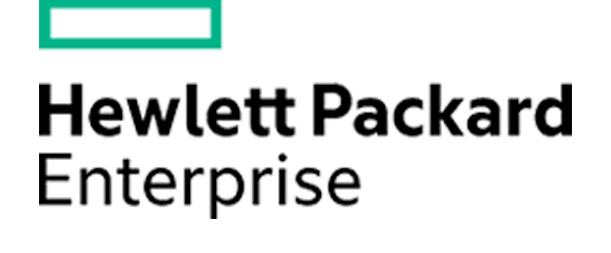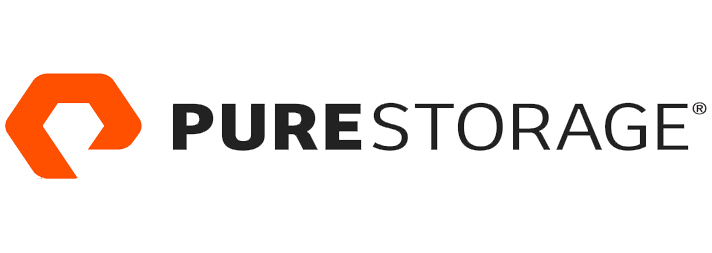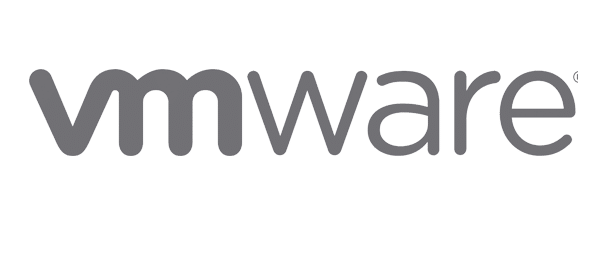Is Colocation the Right Choice for Your Company?
Colocation data centers lease equipment, space, and bandwidth to companies for network and server operations. This allows companies to retain control of their hardware and IT environment, while the technology solutions provider maintains the physical space, resources available for use and support services to maintain uptime.
From on-premise to cloud services, companies have never had as many options for IT setup as they do today.
With these choices comes flexibility. Now colocation can be a hybrid design allowing you to utilize the right mix of cloud services and on-prem that works best for your technology needs.
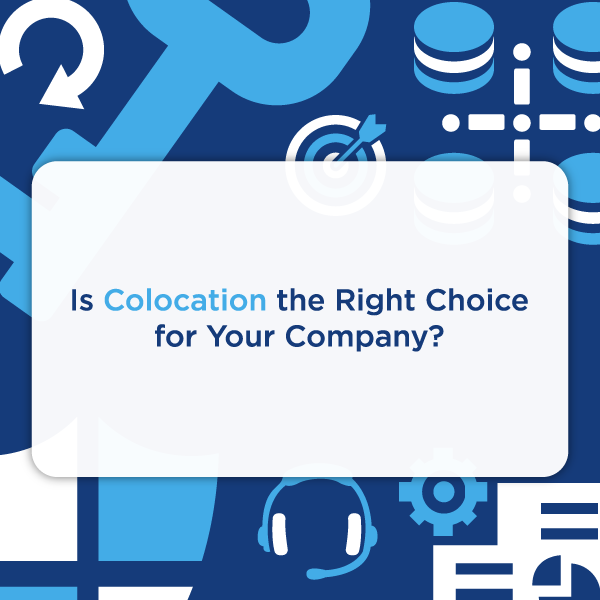
Colocation is an appealing option for companies that are exploring how the cloud might work for their business without having to commit to using it for every application.
This introductory article on using colocation data centers is designed to help you better understand what colocation is, why it’s beneficial, and what factors to consider before implementation.
Table of Contents
- What is Colocation?
- Benefits of Using Colocation Data Centers
- Considerations Before Implementing Colocation
What is Colocation?
Let’s start with the basics. Colocation is a type of infrastructure offering in which a company leases space in a data center from a third-party provider. This rented space is typically in the form of racks, cabinets, cages, or rooms. Along with physical space, companies may also lease equipment, networking services and ISP services to support their compute. When working with ComportSecure, we help you determine what mix is appropriate for your business and how to best leverage the available resources.
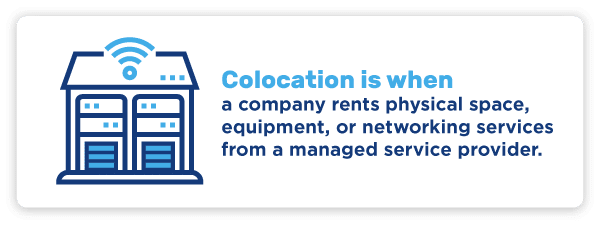
One of the largest advantages of using an IT solutions company for colocation is that they are responsible for daily management of the facility, including power, temperature, cabling and support. This ensures uptime for your environment and reduced time spent by your IT department in the data center.
Colocation goes by a few different names, all of which refer to the above service:
- Colo
- Colo center
- Carrier hotel
Colocation data centers are on the rise with a compound annual growth rate of 14.6% by 2022, as noted in a report by Markets and Markets. This growth is persuaded by colocation’s unique ability to help companies move toward the cloud while still having full control of their internal IT environment.
Benefits of Using ComportSecure Colocation Data Centers
When considering your IT environment, no service or solution is one-size-fits-all—and colocation is no exception. The benefits and drawbacks of colo need to be evaluated in relation to your business needs. While ComportSecure is a colocation service provider, our team of experts consult on a case-by-case basis to make recommendations specific to your business needs.
Now that we have that giant “it depends” disclaimer out of the way, here are the top benefits of using a colocation data center.
 Retain control of hardware. The most notable advantage of colocation is that you can maintain ownership of your hardware. Yes, you can bring your own! And if hardware is at the end of its life, colocation provides dedicated hardware just for you. This ownership comes at a fraction of the cost of building and housing your own data center. Owning or leasing hardware in a third-party data center means you no longer have the hardware refresh conundrum and it is 100% under your control.
Retain control of hardware. The most notable advantage of colocation is that you can maintain ownership of your hardware. Yes, you can bring your own! And if hardware is at the end of its life, colocation provides dedicated hardware just for you. This ownership comes at a fraction of the cost of building and housing your own data center. Owning or leasing hardware in a third-party data center means you no longer have the hardware refresh conundrum and it is 100% under your control.
 Increased reliability. ComportSecure’s colocation data centers provide top-tier security, power and temperature regulation features. From using 100% renewable energy for power outages, to state-of-the-art NOC technology and security in the world, our colocation data centers are constructed to protect your hardware and data no matter what.
Increased reliability. ComportSecure’s colocation data centers provide top-tier security, power and temperature regulation features. From using 100% renewable energy for power outages, to state-of-the-art NOC technology and security in the world, our colocation data centers are constructed to protect your hardware and data no matter what.
 Disaster recovery. Housing data backups and replicas solely on-premise poses a huge risk should your company’s physical location experience a natural disaster. Colocation centers help ensure business continuity in the face of damaging events by taking data protection entirely off-site with the ability to have a dedicated disaster recovery (DR) environment that is easily tested to ensure RPO and RTO benchmarks are met.
Disaster recovery. Housing data backups and replicas solely on-premise poses a huge risk should your company’s physical location experience a natural disaster. Colocation centers help ensure business continuity in the face of damaging events by taking data protection entirely off-site with the ability to have a dedicated disaster recovery (DR) environment that is easily tested to ensure RPO and RTO benchmarks are met.
 Flexible resource consumption. Not sure how much space you need? That’s ok. Colocation allows for complete customization and scalable growth. These services can be as managed or as unmanaged as your team wants. Simply ask for assistance, and ComportSecure is ready to swoop in as backup. We offer several options for consuming resources, including Comport’s cloud team and working with HPE to leverage GreenLake’s consumption model.
Flexible resource consumption. Not sure how much space you need? That’s ok. Colocation allows for complete customization and scalable growth. These services can be as managed or as unmanaged as your team wants. Simply ask for assistance, and ComportSecure is ready to swoop in as backup. We offer several options for consuming resources, including Comport’s cloud team and working with HPE to leverage GreenLake’s consumption model.
Colocation is beneficial for companies that are trying to find the right mix of cloud and in-house IT solutions to maintain budget friendly yet effective IT environments. Each one of the above benefits is layered with capex savings, helping prove the ROI of cloud and data center services.
Before sailing away into the highly charted territory of colocation, give some thought to the below considerations.
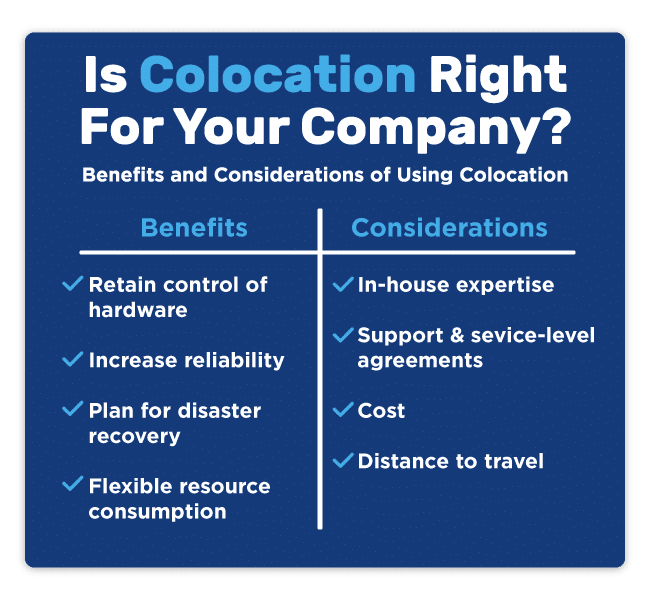
Considerations Before Implementing Colocation
These four considerations give you a bigger picture of what it’s like to use a colocation data center.
1. In-house expertise. Likely the biggest factor to consider when researching colocation is whether your in-house IT team’s expertise is up to managing the hardware and DR plan. Colocation is a good fit for teams that have the skills to design and maintain their own IT environment however don’t have the extra resources sitting around to put out fires or manage every patch update. ComportSecure’s engineers are here to support your team’s bench strength with expertise at the ready.
2. Support & Service-Level Agreements (SLAs). Working with an IT solutions company means you get customized support, so be upfront with your business needs and how your vendor can best help your team. These details will live in the SLA, so be sure to read them thoroughly and adjust as needed before signing up for service. Make sure you right size your colocation provider with your company and feel comfortable calling on them for support day or night.
3. Cost. When comparing the cost of using a colocation data center versus building your own redundant environment, colocation comes out on top as a cost-effective step.
However, when comparing colocation to a more hands-off IaaS option, be aware of the added responsibilities from your team.
Cost is definitely a factor, but it shouldn’t be the end all be all of your decision-making. Lean on your technology solutions partner for expert guidance on your IT decisions so that you receive the best return for your investment.
4. Distance to travel. A lesser thought of factor in colocation is the time and expense of traveling to the colocation data center to manage the equipment. While it is extremely beneficial that data backup is located on a different site from your company’s physical location, companies need to consider travel time and expense for their IT staff when looking at the big picture of pursuing colocation. A qualified data center team will allow you to function the same from a thousand miles away as if you were right next door.
Like many as-a-service options, using a colocation as a service depends on your business needs. While it may not be right for everyone, colocation can be instrumental in helping companies take that first step towards their cloud journey.
Today’s IT setup has endless possibilities—so many that it’s often overwhelming to make a plan for digital transformation. Rest assured that you are not alone in this journey.
Comport’s free cloud readiness assessment is a good place to start when making plans to update your environment. Contact our expert team for guidance and get started today.

